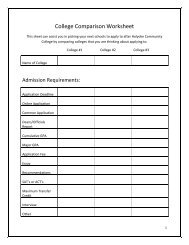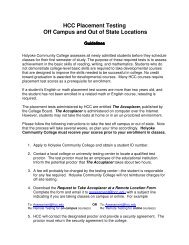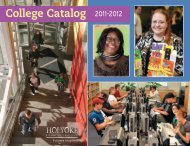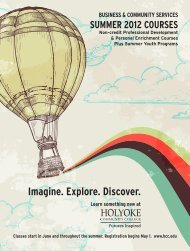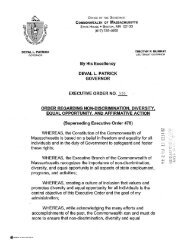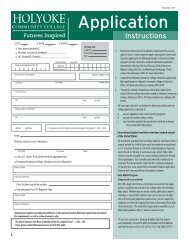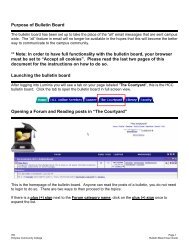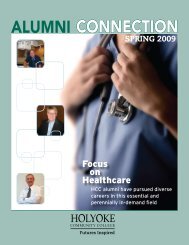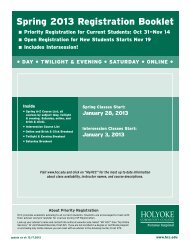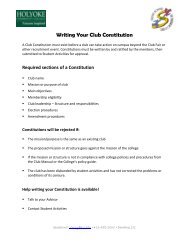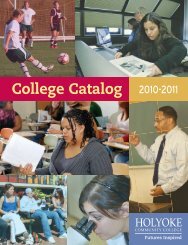Student Handbook 2010-2011 - Holyoke Community College
Student Handbook 2010-2011 - Holyoke Community College
Student Handbook 2010-2011 - Holyoke Community College
You also want an ePaper? Increase the reach of your titles
YUMPU automatically turns print PDFs into web optimized ePapers that Google loves.
networks to libel, slander, or harass any other person.The following shall constitute computer harassment:(1) Intentionally using the computer to annoy,harass, terrify, intimidate, threaten, offend orbother another person by conveying obscenelanguage, pictures, or other materials or threatsof bodily harm to the recipient or the recipient’simmediate family.(2) Intentionally using the computer to contactanother person repeatedly with the intent toannoy, harass, or bother, whether or not anyactual message is communicated, and/or whereno purpose of legitimate communication exists,and where the recipient has expressed a desirefor the communication to cease.(3) Intentionally using the computer to contactanother person repeatedly regarding a matterfor which one does not have a legal right tocommunicate, once the recipient has providedreasonable notice that he or she desires suchcommunication to cease (such as debt collection).(4) Intentionally using the computer to disrupt ordamage the academic research, administrative,or related pursuits of another.(5) Intentionally using the computer to invade theprivacy, academic or otherwise, of another orthe threatened invasion of privacy of another.3. Enforcement<strong>College</strong> officials will review alleged violations ofAcceptable Use policies on a case-by-case basis.Violations of policy will result in appropriate action,such as: loss of electronic mail privilege, loss of computerprivilege, consideration of appropriate disciplinarymeasures and/or referral to appropriate authoritiesresponsible for enforcing state and federal laws concerningcomputer use.Users who breach this code of practice may, after dueprocess, be refused access to the college’s computer andcommunications networks and may be subject to furtherdisciplinary action. In an emergency, in order to preventfurther possible unauthorized activity, the college maytemporarily disconnect that user from the network. Ifthis is deemed necessary by college staff, every effort willbe made to inform the user prior to being disconnected,and every effort will be made to re-establish the connectionas soon as the college determines it is appropriate.The college considers any violation of acceptable useprinciples or guidelines to be a serious offense andreserves the right to copy and examine any files or informationresiding on college systems allegedly related tounacceptable use. Violators are subject to disciplinaryaction as prescribed in student and employee policies,handbooks, or contracts.Offenders also may be prosecuted under laws including(but not limited to) the Privacy Protection Act of1974, The Computer Fraud and Abuse Act of 1986,The Computer Virus Eradication Act of 1989, InterstateTransportation of Stolen Property, Family EducationalRights and Privacy Act (20 U.S.C. Section 1223g),Massachusetts Wiretap Statute (G.L. c.272, Section99), Massachusetts Privacy Statute (G.L. c. 214, Section1B), Copyright Infringement laws (17 U.S.C. Section101 et seq.), the Communications Decency Act of 1996(47 U.S.C. Section 223 (d) - (h))and the ElectronicCommunications Privacy Act of 1986 (18 U.S.C.Sections 2510-21, 2701-10, 3121-27). Access to thetext of these laws is available through the ReferenceDepartment of the Library of <strong>Holyoke</strong> <strong>Community</strong><strong>College</strong>.If you have reason to believe that this policy is beingviolated, you should report it as follows: <strong>Student</strong> Affairs. Administration & Finance. Academic Affairs.4. Use PriorityWhile supporting the general principle of open and universalstudent access, eligibility for systems access willbe determined by the following priorities if insufficientresources are available:1. The highest priority is awarded to students where networkaccess is a mandatory requirement of a coursein which they are currently enrolled.2. At the next level, access will be granted where thereis a demonstrated, but non-mandatory requirementfor network access as described in a course guide.3. The lowest or non-essential level of access will bebased upon the general principle of universal accessand support for academic pursuit while not directlystipulated within a prescribed course of study.5. PrivacyComputers owned by the college are provided for businessand educational use only. Note that the collegeretains ownership of all communications as businessrecords and these records may be subject to discoveryin litigation. Any information on a college computermay be subject to the state’s public records law and may,therefore, be subject to disclosure on request. By usingcomputers on campus, employees and students are waiv-38



